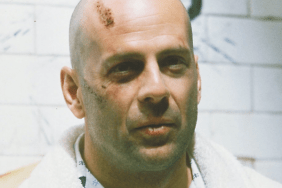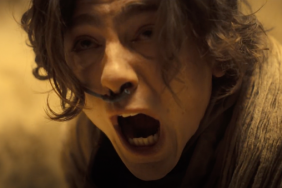After graduating from the dadaist comedy troupe Monty Python, Terry Gilliam made a name for himself as a filmmaker of cynically optimistic fantasies like Brazil, Time Bandits and The Adventures of Baron Munchausen. He also inadvertently made a name for himself as a filmmaker who attaches himself to doomed projects that either go over budget or never get made (or both, as happened with The Man Who Killed Don Quixote, a process captured in the documentary Lost in La Mancha).
Terry Gilliam’s latest film, The Zero Theorem, is a lower budgeted production that revisits themes from his Kafkaesque early films and seems to have avoided his infamous, unfortunate production tragedies. Christoph Waltz stars as Qohen Leth, a nervous computer expert whose pleas to work from home – so he can await a phone call that he believes will one day give his life meaning – are accepted by a mysterious corporation that wants Leth to solve “the zero theorem,” which would prove that 100% equals 0% and, by extension, that everything in the universe is meaningless.
I got Terry Gilliam on the phone to talk about the themes of The Zero Theorem and his work to date, the strange little details hidden in the corners of his latest movie, and to get updates about his alleged offer to make a film for the stop-motion animation studio Laika – those rumors are true – and hear some positive but unofficial news about his long-gestating productions of The Man Who Killed Don Quixote and The Defective Detective, a fantasy film he co-wrote with Fisher King screenwriter (and The Last Five Years director) Richard LaGravenese.
The Zero Theorem is now available on VOD, and premieres in select theaters on September 19, 2014.
CraveOnline: So I saw Zero Theorem, and honestly the film made me kinda sad.
Terry Gilliam: Good!
That’s good?
It’s a sad film. [Laughs.] It’s good because it is a sad film. It’s not quite a tragedy but it is a very sad film, and it has that effect on me as well so thanks for getting that.
You’re welcome.
[Laughs.]
I look at your films and I see this frequent conflict within them between optimism and cynicism. Do you think that’s a good way to put it?
Yup. I think they’re very much driving forces in my life, and it’s a fine balance whichever one is winning on any particular day. Because the worst thing is to be an optimist whose optimism hasn’t paid off in the way he thought it was going to be when he was younger. So you end up… I don’t want to be a pessimist yet, so I can be a cynic. That’s what I can be.
Zero Theorem seems to divide itself between the isolated world of Qohen and this really hectic, kind of beautiful but kind of ugly outside world that just never shuts up.
Right. That’s the way I see the world. [Laughs.]
When we look at the outside world of Zero Theorem we see a lot of details. Is that all from your imagination or are you just looking outside and jotting things down in a different way?
Well, yeah, I’m jotting things down in a different way. I keep trying to make documentaries is what I’m doing. I just push things on. As a cartoonist, that’s what I’ve always been, you take what’s out there and you make it a bit more grotesque. You stretch it a little bit more this way, a bit more that way, but there’s a point to “Occupy Mall Street.” Okay, let’s take a political movement that’s about trying to correct society and then just turn that into an ad to sell something. That’s why I don’t think I’m as cynical as the real world is. And “The Church of Batman the Redeemer.” Come on, I mean how is Marvel surviving? It’s because people believe in Batman and Superman and Marvel comics more than they believe in anything else.
It does seem like it’s only a matter of time.
[Laughs.] I hope so.
This was a little detail but I thought it was amusing: tell me about the invisible cigarettes.
[Laughs.] Well done! Thank you for that. I mean, we all think that smoking is so funny and yet it’s such a cool thing to have, to have a cigarette in your mouth. You look good when you have a cigarette. So I thought, let’s just turn this whole thing into a world where people pretend to have cigarettes and behave as if they’re inhaling and blowing smoke in someone’s face. Because you get the pleasure of your fingers looking cool like that, without the lung cancer. It seems very sensible. Pragmatic!
Best of both worlds!
It’s very funny because, I think that came out of being with somebody in a cool restaurant in London, and this person was actually Russian and had one of the first electric cigarettes and turned it on and watching all the heads in this place turn, the shock of it. And yet she was really cool with her fake cigarette! [Laughs.] It was funny. Let’s just make it ordinary. Let’s just make it just what it is. It’s those details. I’m glad you noticed that because I kind of feel sometimes that people aren’t paying attention.
I feel like in every Terry Gilliam joint you have to scan the details of the room. It never feels like you’re phoning something in. It always feels like you’re thinking in every shot.
I’m trying to make a world that’s real and full of detail, and all the detail has meaning or significance in some form or another. That’s why then you can be, as far as I’m concerned, then you can be more satirical, you can have more fun by creating a world that has a reality you can play with.
And yet at the same time Zero Theorem is allegorical in its search for meaning. You’re using specificity to tell a very universal story.
Yeah, I know but that’s it. It’s not just some vague abstracts. I’m trying to keep things fairly tangible, even to the point if you’re going to have a call, you might as well have John the Baptist and the Holy Spirit descending on the altarpiece behind Qohen’s work station, and if you’re going to do that you might as well have white doves in the chapel as well! I love symbolism is what I do. I really love symbolism, and hopefully there’s enough people that recognize the symbols, and then you layer it with all of this. And some of it’s serious, and some of it’s just fun, and I don’t distinguish between the two.
Tell me about something symbolic: when Qohen is trying to crack the zero theorem, you visualize it very much like a video game. It reminded me of Portal.
Yeah.
Tell me about creating that video game. Is it real? Can we play that someday?
Well, there you go. Maybe someone will come forth. I wanted something that, number one, was not mathematical. Not what you normally see on computer screens when people are doing their nonsense. So okay, let’s have it like these blocks. What did is it became something very, again, tangible in a virtual way, and Qohan has freedom, he can fly. The world exists in there. He can do these mathematical problems but in something that’s exhilarating. That was very important. It’s also the way a lot of our computer systems work now in the military. Iron Dome over Israel, it’s basically based on some rockets made Raytheon called Patriot rockets, and you fly them like you do in a computer game, except to kill people.
The point is, it’s a game. So that’s one reason I did it like this. Things are more gamelike. It doesn’t matter what the task is, it’s done as a game. Again, I had this problem with most of the film taking place in this one chapel, so let’s at least on the screen be able to have some dynamic things going on, i.e. flying around with this cubes.
Are we supposed to read anything into the idea that a video game is being used to prove the meaninglessness of existence?
You can read what you like into that one! [Laughs.] I don’t really like to say specifically what my intentions are. I hope people take away from the film what they want to take away, their version of it. I’ve always been intrigued by… well, those that like the film, let’s not talk about those [who don’t] but… that people come away with their own version of what it’s about, and I love that. It may not be the same version that I was intending, but I love the fact that everybody’s got their own version.
I feel like everyone can approach the film’s fundamental question in a different way, and depending on the day… I don’t know, if everything adds up to nothing, then ipso facto, nothing adds up to everything, right? Isn’t everything meaningful? Isn’t that also part of it?
Yup. The old ipso facto quotient, yeah. That’s it. What’s valuable? It’s up to you to make sense of it, to give meaning to things. And it’s all quite wonderful. I find the world an extraordinary place; it fills me with awe, and there’s so much of it. You can look at it so deeply and so superficially. It’s an extraordinary place. What it means though, that’s up to you.
One of the things that makes the world such an extraordinary place is that now we have a scene in which Tilda Swinton raps.
Mm-hmm. It’s a dream come true on film.
Tell me about that. Was she game? Was she throwing up gangster signs? Was she totally into it or did you have to guide her into that?
Well, she was the one who actually introduced me to “Gangnam Style.” I didn’t even know about it! [Laughs.] Tilda loved it. She’s somebody I’ve known for years and always wanted to work with, and here was a chance to do so. I designed what I thought she ought to look like, and I did this sort of pyramidal hairstyle, but when I first met to talk about all that she says, “I’m thinking, I’m a psychiatrist. I should be identifying with my patients in whatever way is possible. So I would like to play this character bald.” So we ended up with both my hairstyle as a wig, and her bald as she had hoped to be. When you’re working with people like Tilda, and in fact most of the people I work with, they’re brilliantly creative people and they want to take advantage of the slot they’re given to really play with it. She’s wonderful.
Is it true that Laika has been after you to direct a film for them?
There have been talks, yeah. We keep meaning to have a good proper telephone conversation and it doesn’t seem to quite happen. Somebody involved is always unavailable. We’ll see. We’ll see what happens.
Is there something you’ve always wanted to do in animation or are they pitching you something?
No, I don’t have any ideas anymore. [Laughs.] I just want to get the old scripts that have been languishing for years made. So no ideas that I might be interested in. There’s certain things I keep wondering whether I can turn them into animated films even though they were written as live-action films. There’s enough of that stuff sitting in drawers to occupy me till I’m dead.
One project of yours I was always really fascinated by was The Defective Detective.
Ah yes…
I managed to get my hands on a copy of that screenplay a long time ago and I thought it was brilliant. I was really excited about that.
It is brilliant.
Yeah, has there ever been more movement on that?
Well we’ve been talking about something and I shouldn’t say much of anything, but there have been some talks among my former agent [about] resurrecting it in some form or t’other. I think it’s a great script and Richard LaGravenese and I have been talking about it for a while. It’s been languishing in the bowels of Paramount Pictures, so we shall what comes of these chats we’re having.
And I’m legally obligated to ask about Don Quixote.
Ah yes, of course.
I’m sorry, but I’m very curious… Is there any movement on that?
Well… yes. The producer is talking to a couple agents of a couple actors at the moment, and somebody who says they’ve got the money for us. So these things are happening. Whether it all becomes a reality we’ll find out soon.
I really hope so. I’m excited about it.
How frightening that is, that people have been waiting for so many years. I can only disappoint with what I’m offering the world. [Laughs.]
Isn’t that a certain amount of freedom as well, that whatever you do…?
The freedom to disappoint? [Laughs.]
Sure, why not? You can make the most brilliant movie ever and you don’t have to worry about their reaction. You know it ahead of time.
You know, I don’t care anymore. I just want to get rid of it. I want to get it out of my body. [Laughs.] To be excised so I can live my life again!
William Bibbiani is the editor of CraveOnline’s Film Channel and the host of The B-Movies Podcast and The Blue Movies Podcast. Follow him on Twitter at @WilliamBibbiani.









